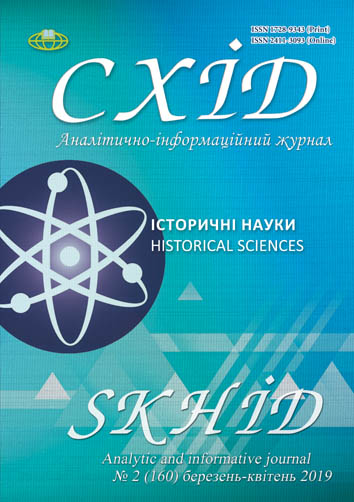A comparative analysis of Georgia’s European integration policy during the presidency of M. Saakashvili and after the change of power October 1, 2012
DOI:
https://doi.org/10.21847/1728-9343.2019.2(160).165738Keywords:
Georgia, Foreign Policy of Georgia, European integration of GeorgiaAbstract
The article analysis foreign policy of Georgia towards EU integration since 2003. Georgia's EU integration policy was activated after the "Rose Revolution". New President of Georgia M. Saakashvili enjoyed strong support of the West, but Russia-Georgia war in 2008, unsuccessful reforms, high level of unemployment made his policy unpopular within Georgians and in October 2012, people voted against the ruling party. Defeat in parliamentary elections was a negative turning point for Saakashvili and his supporters. They started discreditation of the new coalition government policy (especially foreign policy) claiming that aim of Georgia's foreign policy is not European and Euro-Atlantic integration anymore, that representatives of the new government are agents of the Kremlin. An analysis of Georgia’s foreign policy in the context of EU integration shows that the priorities of Georgia’s foreign policy are unchanged. The goal of Georgia’s foreign policy is membership of the EU.
References
Constitution of Georgia, Retrieved from: https://matsne.gov.ge/ka/document/view/30346?publication=35 (Accessed 15 March 2019).
Edward, Lucas (2009). The New Cold War: How the Kremlin Menaces Both Russia and The West. Kyiv, 352 pp. (In Ukrainian).
Foreign Policy Strategy of Georgia 2006-2009. Tbilisi, Retrieved from: https://www.gfsis.org/media/download/GSAC/resources/115_1973_997704_Strategy_MFA2006-2009En.pdf (Accessed 15 March 2019).
Foreign Policy Strategy of Georgia 2009-2012. Tbilisi, Retrieved from: http://germany.mfa.gov.ge/index.php?lang_id=geo&sec_id=1602(Accessed 15 March 2019).
Foreign Policy Strategy of Georgia 2019-2022. Tbilisi, Retrieved from: http://mfa.gov.ge/getattachment/MainNav/ForeignPolicy/ForeignPolicyStrategy/2019-2022-clebis-saqartvelos-sagareo-politikis-strategia.pdf.aspx (Accessed 15 March 2019).
Kakachia, K. (2011). Challenges to the South Caucasus Regional Security Aftermath of Russian-Georgian Conflict: Hegemonic Stability or New Partnership? Journal of Eurasian Studies. № 2. P. 15. DOI: https://doi.org/10.1016/j.euras.2010.10.005.
Kakachia, K. (2013). Georgia: identity, foreign policy and the politics of a “Euro-Atlantic orientation”. Norwegian Peacebuilding Resource Centre. P. 2. Retrieved from: http://georgica.tsu.edu.ge/files/04-Foreign%20Affairs/Kakachia-2013.pdf
Kakachia, K. and Minesashvili, S. (2015). Identity politics: Exploring Georgia foreign policy behavior. Journal of Eurasian Studies. № 6, pp. 171-180. DOI: https://doi.org/10.1016/j.euras.2015.04.002.
Kopiika, V. V. (2008). Enlargement of the European Union and Ukraine. Kyiv, 352 pp. (In Ukrainian).
Leushkin, D. V., Sukhiashvili, D. (2019). Evolution and Mail Stages of Relations between Georgia and NATO. The journal "Vestnik of Lobachevsky University of Nizhni Novgorod”. № 1, pp. 242.
Melikyan, J. (2014). Georgia's foreign policy after the parliamentary elections of October 1, 2012. Central Asia and the Caucasus. Vol. 15, No. 1. p. 78-88.
National Security Concept of Georgia, 2005. Tbilisi, Retrieved from: http://www.parliament.ge/files/292_880_927746_concept_en.pdf (Accessed 15 March 2019).
National Security Concept of Georgia, 2011. Tbilisi, Retrieved from: https://mod.gov.ge/uploads/2018/pdf/NSC-ENG.pdf (Accessed 15 March 2019).
Rayfield, D. (2017). Edge of Empires A History of Georgia, Moscow, 479 pp. (In Russian).
Resolution on Basic Directions of Georgia's Foreign Policy, 2013, Retrieved from: http://www.parliament.ge/en/ajax/downloadFile/23920 (Accessed 15 March 2019).
Sukhiashvili, D. (2012). Trade dialogue between Georgia and the EU. National Technical University of Ukraine Journal. Political science, Sociology, Law. №2 (14). P. 18. DOI: https://doi.org/10.20535/2308-5053.2012.2(14).123202 (In Ukrainian).
Transparency International, Retrieved from: https://www.transparency.ge/en/post/almost-half-survey-participants-support-holding-2020-parliamentary-elections-based-proportional (Accessed 10 April 2019).
Vachudova, M. A. (2009). Europe Undivided: Democracy, Leverage, and Integration After Communism. Kyiv, P. 379 (In Ukrainian).
Zasztowt, K. (2013). Georgian Dream's Foreign Policies: An Attempt to Change the Paradigm? The Polish Institute of International Affairs. Retrieved from: https://www.files.ethz.ch/isn/159668/PISM%20Policy%20Paper%20no%203%20(51).pdf (Accessed 15 March 2019).
Downloads
Published
How to Cite
Issue
Section
License
Copyright (c) 2019 Davit Sukhiashvili

This work is licensed under a Creative Commons Attribution-NonCommercial-NoDerivatives 4.0 International License.
1. Authors bear responsibility for the accuracy of facts, quotations, numbers and names used.
2. Manuscripts are not sent back.
3. The publisher does not always agree with the authors' opinion.
4. The authors reserve the right to authorship of the work and pass the first publication right of this work to the journal under the terms of a Creative Commons Attribution Non-Commercial License, which allows others to freely distribute the published research with the obligatory reference to the authors of the original work and the first publication of the work in this journal.
5. The authors have the right to conclude separate supplement agreements that relate to non-exclusive work distribution in the form in which it has been published by the journal (for example, to upload the work to the online storage of the journal or publish it as part of a monograph), provided that the reference to the first publication of the work in this journal is included.

